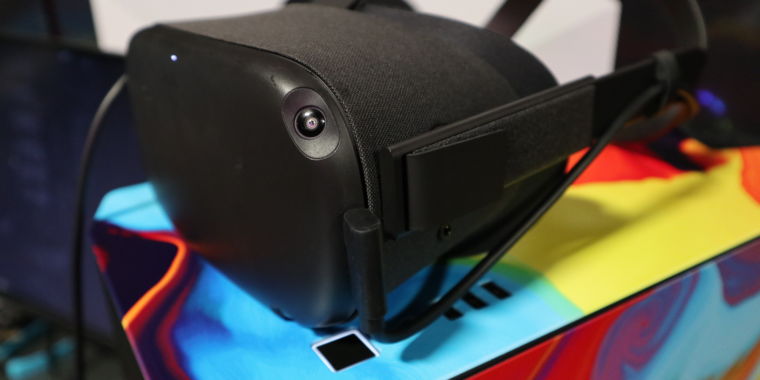
-
Behold: the Oculus Quest, as photographed in my messy home.
-
A gray fabric lining around most of the unit is a nice touch.
-
Just like on the original Oculus Rift, the Quest's side straps include elastic slack so you can pull them off your face when you have them set to your ideal tightness.Sam Machkovech
-
USB Type-C port and one of the headset's two 3.5mm headphone jacks.Sam Machkovech
-
The other headphone jack and the power button.Sam Machkovech
-
On the bottom, you can see the volume buttons and the physical IPD (inter-pupillary distance) slider.Sam Machkovech
-
A closer zoom on one of the headset's four sensors. Each is angled enough to enable something apparently wider than a 180-degree tracking zone.Sam Machkovech
-
Bad news: Oculus Quest will not work without syncing it up to your smartphone at least once. (The same is true of last year's Oculus Go.) Good news: once you sync it, you can uninstall the Oculus smartphone app and never use it again.Sam Machkovech
-
The usual lens warnings before diving in.Sam Machkovech
-
Oculus Quest (left), HTC Vive Pro (right). Vive Pro gets some added bulk thanks to its "pro"-grade strap and physical earbuds, as opposed to Oculus Quest's use of recessed built-in speakers.Sam Machkovech
In a blog post today, Oculus says its console-like curation approach for Quest has been a success, highlighting over $100 million in Quest content sales in its first year. That same tight curation will still apply for the main Quest store going forward.
But Oculus now says it will also be adding "a new way for developers to distribute Quest apps" in early 2021. This new channel "will enable developers to share their apps to anyone with a Quest, without having to be accepted into the Oculus Store, and without the need for sideloading," the company writes.
Currently, adding unapproved apps to a Quest headset requires setting the device to a less secure "Developer" mode and using a PC-based tool like SideQuest to transfer the necessary files. Oculus isn't sharing many details about its new app distribution method, but the process sounds like it will be more streamlined for end users looking for a wider array of VR software.
While Quest apps in this new channel will still have to conform to Oculus' general content policies (e.g., no pornography, no hate speech, no real-money gambling, etc.) Oculus writes that "apps distributed through this new channel won't be held to the same technical standards as official Oculus Store apps." That makes it ideal for developers who "want to share their apps as broadly as possible [or] test early-stage applications and distribute to specific users."
Oculus' move comes as Apple faces its own controversy and potential antitrust probes surrounding overly tight control of its iOS App Store.
“Go” bye-bye
-
Go, frontal view.Sam Machkovech
-
Go with its power indicator on. The volume buttons are easy to access and press in the middle of any action.
-
The back of Go's box.
-
Lift the top off to expose this nicely arranged set of parts.
-
The thin, black box opens up to expose these accessories, including a "glasses spacer."
-
What is Oculus Go? Let the instruction manual tell you.
-
Instructions for how to replace controller batteries, how to add the glasses spacer, and other general setup suggestions. Worth noting: I never needed to install the glasses spacer while wearing my own bulky glasses.
-
Zoom on the controller's face, which includes a serviceable, clickable trackpad.Sam Machkovech
-
A single trigger.
-
The single controller explodes to expose a single AA-battery slot.
-
How it fits in the author's hand.
-
The strap looks and feels a little flimsy, but it does the job. (See below for how it looks on my head.)
-
The retail version of Go comes with warning stickers attached to the lens. Pretty good way to make sure users notice them.
-
The foam lining is a little firmer than I'd like, but it's serviceable for a discount device. We'll be curious to see aftermarket improvements appear down the line.
-
Micro-USB for charging.
The self-contained Go headset—itself built as a replacement for the mobile phone-based Gear VR line—was the last Oculus product that didn't feature support for hand-tracking controllers or head-tracking six-degree-of-freedom movement. Deprecating that hardware makes some sense for a company trying to make a clean break from the more limited, less capable hardware of the past.
At the same time, the budget-priced Go (only $149 for a 32GB version) was a great entry-level headset for users who wanted a VR experience that was still a step up from something like Google Cardboard. Cost-focused use cases like education, training, and museums will likely be forced to invest in the $400 Oculus Quest instead, even if they don't need its expanded feature set.
Listing image by Sam Machkovech
https://news.google.com/__i/rss/rd/articles/CBMiZmh0dHBzOi8vYXJzdGVjaG5pY2EuY29tL2dhbWluZy8yMDIwLzA2L29jdWx1cy13aWxsLXN0YXJ0LXNlbGxpbmctcXVlc3Qtc29mdHdhcmUtcmVnYXJkbGVzcy1vZi1xdWFsaXR5L9IBbGh0dHBzOi8vYXJzdGVjaG5pY2EuY29tL2dhbWluZy8yMDIwLzA2L29jdWx1cy13aWxsLXN0YXJ0LXNlbGxpbmctcXVlc3Qtc29mdHdhcmUtcmVnYXJkbGVzcy1vZi1xdWFsaXR5Lz9hbXA9MQ?oc=5
2020-06-23 21:04:00Z
52780873910537
Tidak ada komentar:
Posting Komentar